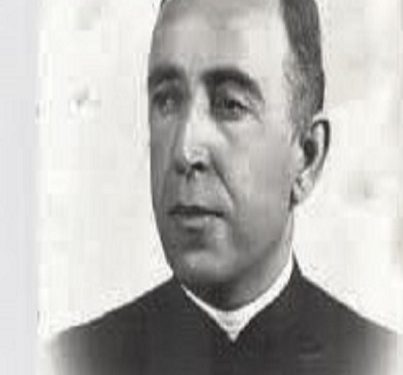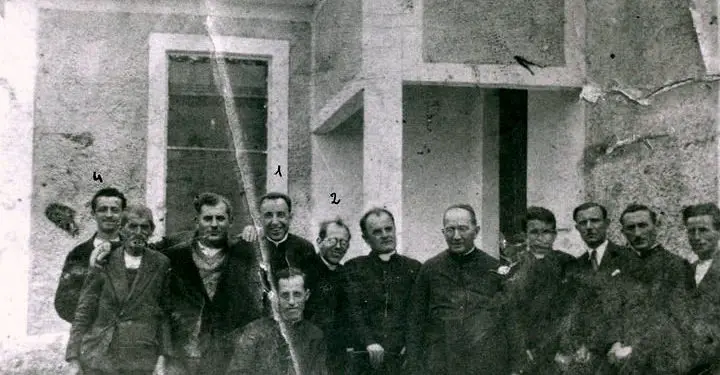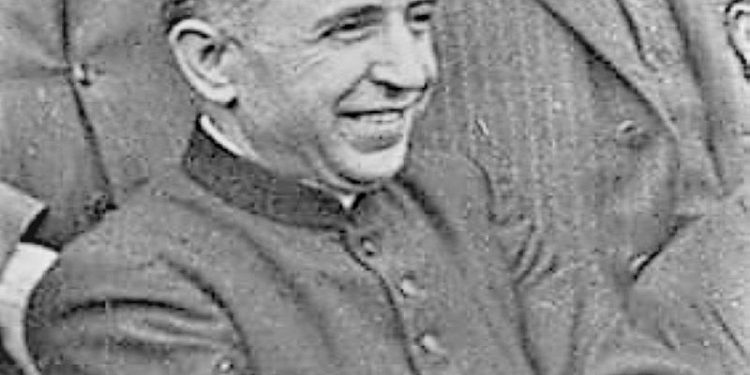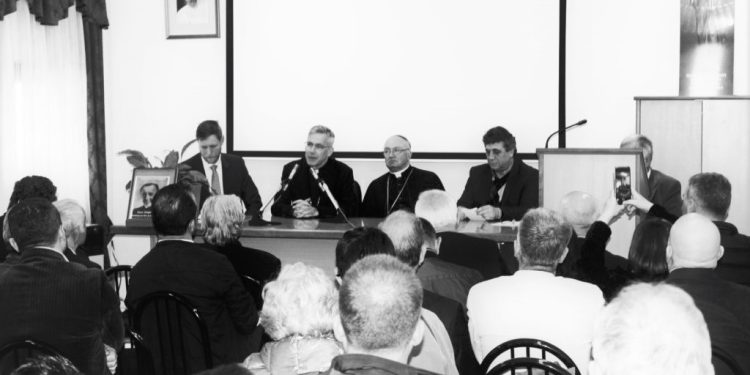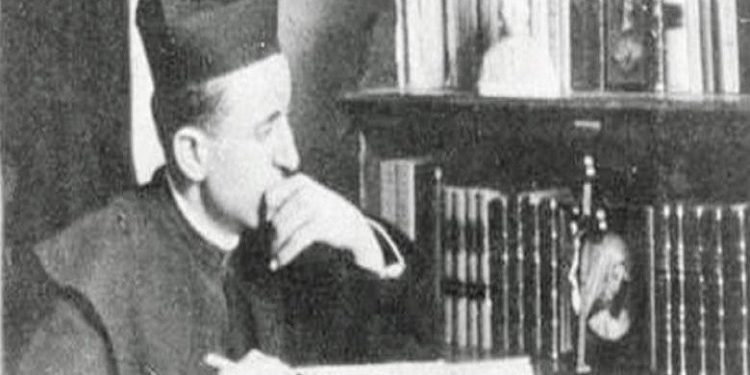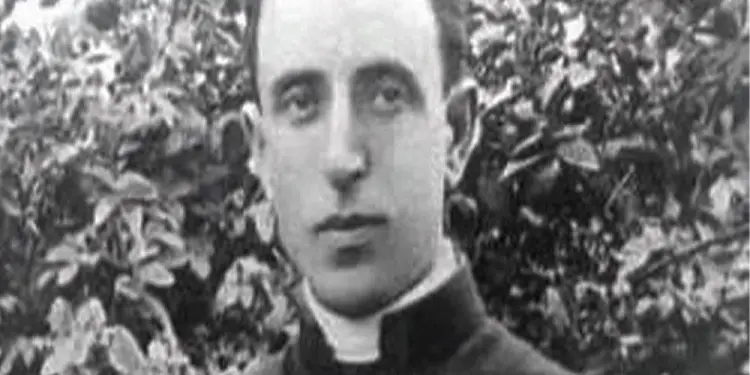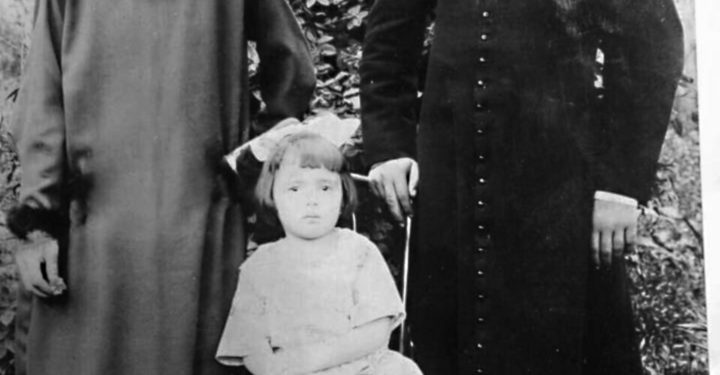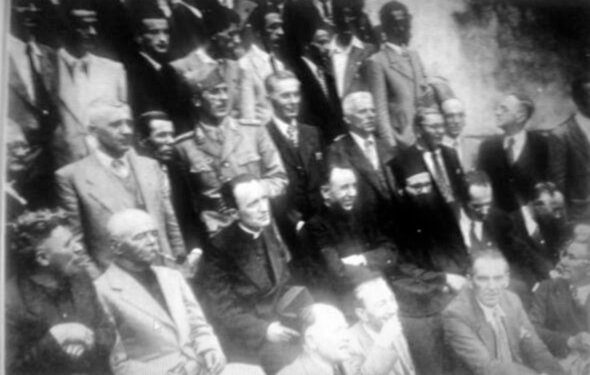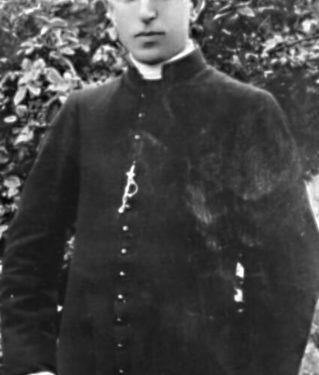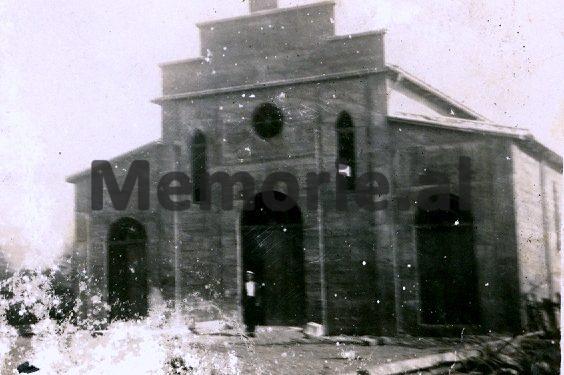NIKOLLË LOKA
Av.ALFDRED DUKA
NIKOLIN KURTI
Part twenty-three
-Continuing the tradition of native Catholic clergy –
Cooperation for the state and only in its interest
While serving the sentence
Verbal process
In Tirana, on July 20, 1970. I, Iliaz Haxhiaj, an investigator at the Ministry of Internal Affairs, asked the defendant Shtjefën Kurti.
Question: Do you continue to give explanations about the hostile activity you have carried out against the people’s power?
Answer: After I got out of prison, in 1963, in the village of Gurëz, I met Ukë Kosova, originally from the Gjakova district of Yugoslavia and living in Laç, but he usually stayed in Gurëz with his mother-in-law Mrika e Gjergj most of the time. Nicholas. Uka has his family in the villages of the Gjakova district, and I, from the time I was there, have known one of his ancestors, named Jak Kosova.
Starting from 1967 and continuing, until the time I was arrested, from time to time, in the meetings I had with Uke Kosova, we had character conversations against the People’s Power Party. Uka boasted, saying that despite all the efforts made by the district authorities, both the Party and the government, to convince him to join the agricultural cooperative, but he has not accepted, even to this day. Uka did not enter the cooperative, with his whole family. To convince her, Kolë Jakova and his brother, Filipi, who are her uncles, also intervened and they were constantly entering and leaving Ukë Kosova’s house, but they didn’t convince her either, and that’s how she won the case.
Both I and Uka have called the collectivization system unfair and we used to say that it is good for everyone to have their own property, as in the previous regimes, to work for themselves. We discussed that until today, this system has not brought anything to light, the peasantry has been greatly impoverished. I told him that day by day we are getting worse with this government, but we must hope for a change in the political situation in Albania and the entire system, because everything in the world is not eternal, everything will change. When I told her like this, Ukë Kosova would listen to me attentively and tell me Ishalla, let’s do this as soon as possible so that we can escape. Likewise, Uka and I talked about the measures taken by the government to close the churches.
This power has touched the most precious thing we have had, which with the greatest difficulties we have preserved for five hundred years in great poverty; whereas this party and this government have not taken this into account, but are educating the youth to have hatred towards us and that with these measures taken against religion, they seek to eradicate Catholicism in Albania, which in the world outside, religion and the Catholic Church is flourishing. Even Uka, even though he is not religious, told me: You are right, this government is doing badly.
In 1967, at the house of Uke Kosova’s mother-in-law, I don’t remember how the conversation went, but I say that the conversation was about Albania’s relations with China. Uka told me that these relations are not good. Regarding this, he told me how China told Albania to leave the United Nations. In this case, I told him how this work can be, when at one time, every year, Albania demands that China be admitted to the United Nations. Uke Kosova reaffirmed yes, that’s how it is as I say. We didn’t talk about this for a long time.
Uke Kosova, he often came to my house and that in most of the conversations I explained above, they took place in the house where I lived. I remember that after Mark (Bardhok) Marku was arrested, by the authorities, Fran Noci’s house was searched and Fran was taken away. At this time, Uke Kosova was also present at Fran’s house, who had told those in the house, don’t be afraid that Fran is coming back to your house! After telling me this event, Uka told me that Frani is a spy for the State Security Organs; without telling me more about it. Ukë Kosova often went to Pjetër Biba’s house, but sometimes we didn’t have the chance to talk together against the government. I know that Ukë Kosova and Pjetër Biba took their wives from the same family.
After reading the process and seeing that my statements are written correctly, I sign it.
Defendant Investigator
Shtjefan Kurti Iljas Haxhiaj
Verbal process
In Tirana, on August 6, 1970. I, Iliaz Haxhiaj, an investigator at the Ministry of Internal Affairs, asked the defendant Shtjefën Kurti.
Question: Do you continue to give explanations about the hostile activity you have carried out against the people’s power?
Answer: On two or three occasions, during this year 1970, I told Peter Biba’s daughter, Dava, do you want to listen to the Vatican radio, but she told me I don’t want to listen to it, I’m going to sleep. These cases happened, when she came in the evening to listen to the radio post, until half past nine in the evening. And on two or three other occasions, I, in the presence of Dava, in the wee hours of the evening, turned on the radio on the Vatican station, which broadcast the urat in Italian, which we say in Albanian. I translated it into Albanian for Dava and she said it was beautiful, but I wrote it in the original way in Latin with Albanian letters. I wrote it and gave it to you. Later, I asked him if he had learned it? She told me that she had not learned it and that she had torn the paper.
On two occasions, during this year, when he came to my room, he started reading me various articles from the newspaper “Zeri i Populli”, but I told him, read the newspaper for yourself, because I read it myself. I was saying this because I didn’t want to hear what was written in the newspaper and I was saying to Dava, may God overthrow this regime! On another occasion, I took out a sentence from a book that had a monkey in it and I said to Dava, take this, keep it in your head, because this is your great-grandfather.
Dava told me that it is yours too; I answered him, let it be yours, because I myself am from God. When I spoke to Dava about listening to the Vatican radio, Prena Biba was also present, but she didn’t want to listen to it either. Prena was also present when I spoke to Dava about the monkey issue, but she didn’t say anything, she just listened.
After reading the process, I signed it with my signature.
Defendant Investigator
Shtjefen Kurti Iljas Haxhiaj
Verbal process
In Tirana, on August 13, 1970. I, Iliaz Haxhiaj, an investigator at the Ministry of Internal Affairs, asked the defendant Shtjefa Kurti.
Question: Do you continue to give explanations about the hostile activity you have carried out against the people’s power?
Answer: In 1967, I went as a worker to the warehouse of the agricultural cooperative Gurëz, in Alke. Next to the warehouse I had my room where I lived. This room was given to me by the cooperative. In the warehouse, I found Luigj Vata as a warehouseman; so, my work has been under his direction. During the year that I have been working together with Luigj Vaten, I have talked to him about the measures taken by the Party against religion and the closing of churches. I told Luigi that this measure is unfair and they have taken us by the neck. I told him that this government is behaving wildly with us, it wants to extinguish Catholicism in Albania, both in political, economic and social relations, as well as in relations with other countries.
This, I said, will come as a result of the changes that will take place in the leadership of the Party and the state, where the current leadership is to be replaced by another, softer leadership, and thus the time will come when to become churches again.
Louis was very concerned about how to organize the children, after the closing of the churches; and I told him that we have taught you how to baptize your children yourself and, if you want to confess, ask God to forgive you for your sins, that God is everywhere, promising him that you will not do them again ma. In continuation of these conversations, I also spoke to Luigj Vata about the life I had led in the previous regimes, telling him that at that time I didn’t miss anything. I have lived a comfortable life, while in this current regime, the salary that the worker receives is not enough for bread. I had all these conversations and other conversations with Luigi in the warehouse where we worked, but there were also occasions in the room where I slept. Luigji didn’t oppose me, he just kept his mouth shut.
Luigi told me at that time that when he was a soldier, he was proposed there to join the party and remove the sign of the cross from his hand, but this one, to join the party and remove the sign of the cross, had not accepted. In this case, I told him that you did well not to accept joining the party and not to remove the sign of the cross. I told this to Luigi as something good that he had done, otherwise he would not know God and keep his soul as a religious. With Nush Vata, Luigji’s brother, I had fewer political conversations. These conversations have been about living, telling him that I am not good enough to realize even a norm. In the previous regimes I lived better, today I live badly, I sew bags.
I spoke badly about the measures taken by the ruling party in the direction of religion and the closing of churches, telling him that these measures are not right, that they demand the extinction of Catholicism. Nushi told me that they are acting worse, but there’s nothing you can do, you have to submit to this fate, don’t get upset, because no one has two lives. In your time you lived well, but even today they can help you in the mill. I told both Luigji and Nushi that I had a friendship with their father Preke Vata, when I was a parish priest in Gurëz during the years 1932-1938. They also told me that their father talked about this friendship.
After I read the process and saw that my statements were written correctly, I signed it.
After reading the process, I signed it with my signature.
Defendant Investigator
Shtjefen Kurti Iljas Haxhiaj
Verbal process
In Tirana, on August 18, 1970. I, Iliaz Haxhiaj, an investigator at the Ministry of Internal Affairs, asked the defendant Shtjefa Kurti.
Question: Do you continue to give explanations about the hostile activity you have carried out against the people’s power?
Answer: In 1964, I met Agostin Mark Preçi from Gurëzi as a teacher. With this, I only had one greeting when we met on the street. Later, this and another were removed from education, because they did not have Pedagogical school. After he was removed from education, I was told that for a while he worked as a waiter, I don’t know if in Fushë-Kruja, or in Tirana. For two or three years now, I have seen him working in the agricultural cooperative in Gurëz, as a worker.
During the months of March and April 1970, I had the chance to work twice near where Agostini worked, when I was pruning trees. At break time, Agostini would call me to sit down to rest with him. While resting, the conversation started about the economic state of the country and about the constructions that were being made, and Agostini asked me about the countries I had traveled through and their life, like Italy, Germany, Switzerland, and other countries, and whether their cities were beautiful. like Tirana!
I told him that compared to the cities of other countries, Tirana is like a neighborhood of those cities that have three to four million inhabitants. Also, to Agostin’s question, which country in Europe is the most cultured, but also which country stands out for its peculiarities, I liked it, Switzerland. Every city, I told him, has its own history, like Rome, Paris, Vienna and other industrial cities, Hamburg and others. Agustin Preçi was happy when I told him like that, and he said to me: Blessed are you that you were free to roam the whole world!
Regarding the economic situation, Agostini asked me if corn bread is used in other countries of the West, as it is used here in Albania? I told him that no one knows corn bread in other countries of the West, except us Albanians and the Balkans. I told him that in Europe there is no problem with bread, oil is cheap, wine is also produced in large quantities, especially in Italy, France and Spain, where even the simplest worker does not spread bread without wine, they even told me that in France, the simplest worker does not drink wine, if it is not at least three years old. But as for meat, in these countries, it is more expensive, but nevertheless, it is served in much larger quantities in restaurants than in Albania.
Agostini is very interested in knowing about the external situation, he asks me about aspects of external life, even I was impressed by this and thought that he was provoking me. Agostini himself presented the country’s economic situation as bad, and took as an example the social food in restaurants, saying that it is too weak to serve a little meat, just enough for an appetizer. These are the conversations we had with Agostin Preçi, on two occasions that I spent time with him.
After reading the process and seeing that my statements are written correctly, I sign it.
After reading the process, I signed it with my signature.
Defendant Investigator
Shtjefen Kurti Iljas Haxhiaj
Process – verbal
In Tirana, on August 23, 1970. I, Iliaz Haxhiaj, an investigator at the Ministry of Internal Affairs, asked the defendant Shtjefa Kurti.
Question: Do you continue to talk about the hostile activity you have developed against the government?
Answer: I know Mark Liqin-kulak in Gurëz village. I have known this since the time of Zog, when he was a child, while I was a parish priest in Gurëz. This was one of the children that I, during the years 1932-1938, gave religious lessons to. After I got out of prison in 1963 and went to live in Gurëz, I met Mark Liqin and we got to know each other again, to whom I told him what I had read about in the newspapers when I was in prison, about his weightlifting activities.
In the month of October or December of 1969, Marka Liqi came to my house. On this occasion, I asked him how he spent his time working in the cooperative. He told me that everyone is economically disadvantaged, we are all in need. I also told him like this, we have suffered a lot, especially me, because I am not good at work. Then, Mark began to ask me about the work of closing the churches, telling me how this work was done?
I told him: Well, that’s how the government works, he also closed the churches and now we have to submit to this fate. I told him that in other countries of the world, the church is flourishing and efforts are being made to unite the Orthodox, Protestant churches with the Catholic Church, while here in Albania the churches were destroyed. This measure, I told him, that the party in power has taken and that has militated the youth, is completely unfair. Mark accepted the words I told him.
As early as 1946, I met Marie Miri, the wife of the executed Llesh Miri, a resident of Gurëz. At the time, it was widely known that her husband had been sentenced to death. She came to Tirana and met me. She begged me to give her a letter of recommendation for Tuk Jakova, so that he could intercede to save her husband’s life. I told him I have nothing to do, because I’m in trouble for myself, I’m waiting day by day to be arrested. In 1963, after I was released from prison, I met Marie Mir several times in Gurëz. Maria helped me a lot, making me a flannel and socks with the wool I bought. At this time, I lived at Tom Neka’s house and she came to the room where I slept.
During these meetings I had with Marie, she initially complained to me about her husband who had been executed by this government. She called this sentence unfair, saying that she was not guilty. I used to tell him: Don’t be upset, war has these things because in this war, sometimes even the wet goes for the dry. I told him that I am very sorry for the people who were shot by this government, but we have nothing to do, the war eats wet and dry. Maria said to me: May God put an end to these people, what they are doing to us!
After I read the process and saw that my statements were written correctly, I signed it. Memorie.al




